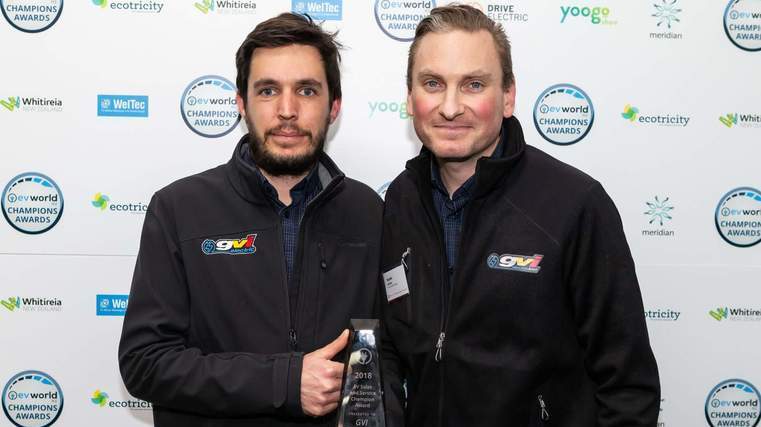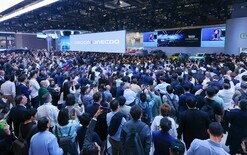Hayden Johnston: committed to EVs

Autofile Online chats with Hayden Johnston, general manager of General Vehicle Imports (GVI) in Penrose, Auckland, to find out more out more about the electric vehicle (EV) space.
GVI Electric was named 2018 EV sales and service champion of the year at the EVworld NZ expo held at the ASB Showgrounds in Auckland, winning the honour for the second time.
According to the judges, the company shows fantastic commitment to sales and service of its customers, as detailed in testimonials submitted as part of the nomination process. You can also read an industry profile on Johnston in the November 2018 issue of Autofile magazine – click here to subscribe.
On winning the champions award
“We were incredibly proud to be nominated and win for a second year,” says Johnston, pictured above with dealership EV specialist Russell Bowden and the award. “We’ve always done things ‘our way’ and it’s nice to know that ‘way’ is appreciated by the EV community.”
GVI Electric’s secret to success is ensuring the customer is educated correctly, which means working hard and taking no short-cuts. “When buying an EV, it’s important to know there are unique characteristics you have to learn to work with.
“You need to go to the right EV specialists so they go through these with you – so you can talk about what sort of driving you’re doing, and where you’re going to park and charge. A specialist can match the right vehicle to the right owner.”
Johnston points out selling isn’t a priority for his team, especially in the case of EVs. “A dealer can’t be scared to not sell a car because it’s not going to work for that owner. That’s why my team is careful that if the car’s not going to be right for them, we tell them.
“There might not be an EV solution that’s going to match your lifestyle without making serious changes. Some people just want to own an EV so they will make those considerations, while others appreciate our guidance and say, ‘cool, I’ll wait for 18 months when there might be more options or when my circumstances change’. We work hard to do things properly. That’s essential. So it’s nice to know that’s appreciated by the EV community.”
On EV consumers’ checklists
As part of EVworld NZ’s public seminars in August, Johnston held his own talk on the “EV buyer’s checklist – what to ask when considering an EV”.
“It was one of the more popular seminars, which for me was terrifying but heart-warming because it shows how much interest there is in EVs. People genuinely wanted to sit there and find out more, so that was cool.
“The crux of the talk was about three main questions we get asked – how far will an EV go on a charge, where do I charge my EV and how long does it take to charge my EV. I discussed the topics of different price ranges versus range, different charging solutions and what you may use in different scenarios depending on where you live.”
According to Johnston, there are a few important dos and don’ts to be mindful of. “Don’t go looking for the cheapest because the reality is if someone is selling on price, they aren’t really interested in selling an EV. You’re going to get a suspect car with suspect educational delivery, which is fine for a Corolla but fine for an EV. A good specialist will educate you and match you with a car that best suits your needs and lifestyle.”
On what’s important for first-time buyers
“When it comes to first-time buyers, there are two ways to do it,” explains Johnston. “Most of us do this when making a larger purchase anyway and that’s doing a degree of homework before going out and approaching somebody. That’s become a natural part of the process.
“But also some people go out unprepared. That’s when it’s essential to talk to a good specialist especially when looking at EVs because there’s a fair bit of education involved in owning an EV.
“The older demographic has been a huge part of our customer base. A lot of retired people may live in retirement homes, so their requirements are perfectly suited to EVs. Those buyers are also naturally a little bit more suspicious of technology or larger purchases. They, more than anybody, may need confidence in the product they’re buying and that people they’re buying from are genuine.
“More and more, we’re seeing a range of people buying EVs, especially as a second car. A lot of people also get quite nervous about approaching workshops and having their vehicles serviced and maintained, whereas with EVs that aspect is removed.”
On the EV service and repair industry
New to EVworld NZ, industry-led forums provided opportunities to delve deeper into New Zealand’s current issues and understand what practical steps might be needed for zero-carbon transport.
Johnston was part of a panel that discussed how to meet the needs of the future EV retail industry, specifically challenges around the education of the service and repair industry.
“There are different maintenance requirements and maintenance schedules with EVs, so there’s a fear the repair industry is going to suffer from the introduction of more EVs, which isn’t necessarily true. It’s just going to change what they do and change their offerings.
“Educating the upcoming mechanics and technicians through education processes at the moment is important and also with the ones that are currently qualified, requalifying them to keep them relevant with the shift into EVs. There are different maintenance requirements and maintenance schedules, so there’s a fear the repair industry is going to suffer from more EVs, which isn’t necessarily true. It’s just going to change what they do and offer.
“There have been some huge advancements over the past 12 months with what is being offered at Polytechnic, NCEA and degrees. If there was a buzzword at the moment, it’s ‘education’. The need for this applies to everything in the EV space – from sales to repairs.”
On the state of our EV industry
“New Zealand is plugging away pretty well,” says Johnston. “Infrastructure is ahead of the fleet at the moment. We have a lot of support from the private sector, such as ChargeNet NZ, which is privately funding a nationwide charging network. This is huge. It’s one of the biggest drivers of EV uptake in New Zealand.
“This country is in a fortunate position to have such private organisations and individuals. There are certainly some heroes motivated to see the conversion of New Zealand’s fleet to electric.”
On Hayden Johnston’s passion for cars
“My family have been selling cars for 30 years. We’ve always sort have been innovators, and tried to be at the forefront of new models and new ways to sell. So when EVs came on our radar about five years ago, we thought they were cool. I also was looking for a way to make my mark on the family brand. You also become part of an amazing community, so it also became not just about selling cars but being in an amazing space.
“That for me, and people who I’ve met along the way and have become friends, that’s amazing. Very rarely do you meet folk so motivated and enthusiastic about something. And to be able to have that sense of community that involves cars is amazing. It’s easy for me to become passionate and excited about EVs.”





